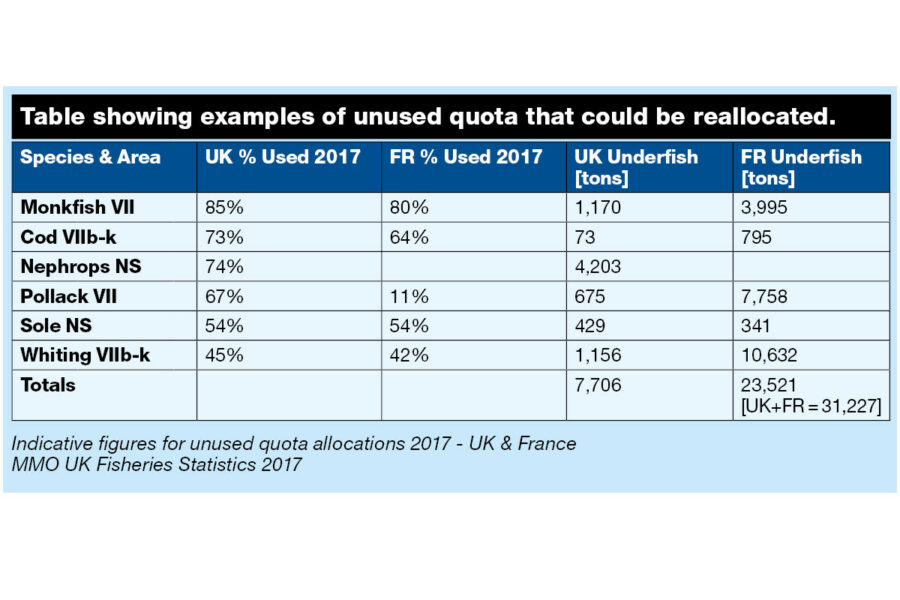Brexit is one-off chance to change quota system. Inshore leader calls for revamp to help coastal communities.
An inshore fishermen’s leader has spelled out that Brexit will provide the government with a one-off opportunity to completely reset the quota allocation system and finally provide a fairer allocation to the inshore small-boat fleet, reports Tim Oliver
NUTFA director Jerry Percy told a conference in London last week that the government should take three steps to carry out this change:
- Affirm public ownership of the UK’s fish resources in the new fisheries bill
- Get ahead of the current FQA distribution mechanism and work out who should get what, and design an allocation system to carry out the results. This should build on the social, economic and environmental criteria spelled out in article 17 of the revised CFP
- Serve notice that there will be a transition from the current system to the new one.
He stressed the urgent necessity of change to rejuvenate the small-boat fleet and coastal communities that suffer high levels of economic and social deprivation.
Spelling out the process by which the UK has arrived at the current quota and fisheries management arrangements, he told the Coastal Futures conference that Brexit provided a ‘one-off opportunity’ to make amends for past mistakes. “Fisheries should be managed in a way that is consistent with the objectives of achieving economic, social and employment benefits, as defined in a suitably amended clause 20 of the draft fisheries bill, which itself builds on article 17 of the revised CFP that makes these objectives mandatory for member states.”
Surprisingly, the bill provides for the sale of rights to use an English catch quota and an English effort quota for a calendar year, and for the payment of compensation to anyone who holds, but does not use, rights sold in accordance with the regulations.
Jerry Percy was, however, pleased to hear fisheries minister George Eustice suggest that, “For the under-10 pool, you might do something very different. You might simply put some extra fishing opportunities in there, and not tender it.”
He said that the government shied away from reallocating existing FQAs, but the 2013 legal case when UKAFPO challenged DEFRA’s right to reallocate unused quota had ruled that while FQAs are property that cannot be removed without compensation, this did not apply to unused quota.
“Judge Cranston ruled unequivocally that unused quota has no value, and therefore can be reallocated without compensation having to be paid, and therefore at no cost to the government.”
Jerry Percy said there was an unarguable case for the new quota that the UK should acquire after Brexit to be reallocated on a completely different basis to the FQA rules for existing quota.
George Eustice had said there would be ‘hundreds of thousands of tonnes’ more fish following a successful Brexit, and had told a parliamentary committee, “As we depart from relative stability and have new fishing opportunities coming in, I do not think it makes any sense at all to compound the injustice of the FQA system.”
Landing obligation
However, Jerry Percy pointed out that the landing obligation that is now fully in force for all quota species will add a whole new dimension to quota allocation pressures, and will increase quota costs as demand rockets.
Cost pressures will also increase, because the fisheries bill also provides for the government to introduce a charging scheme for discards, with cost penalties for landing over-quota fish.
Jerry Percy also said that the Coastal PO, which provides PO facilities for the under-10 fleet, was still being prevented from providing the same opportunities for members as other POs, despite having been officially recognised as a fully-fledged PO nearly two years ago. For example, it is still prevented from retrospective leasing of quota and cross-booking quota, as other POs are able to do.
Jerry Percy is due to meet MMO chief executive John Tuckett in March to discuss this and other issues facing the under-10s, and the Coastal PO officials are in ‘ongoing and positive discussions’ with the MMO in this respect.
Outlining the current situation, he noted how joining the then EEC in 1973 had set in motion the train of events leading to the current management mess and the under-10m fleet problems. He quoted the then prime minister Edward Heath on our accession to Europe: “If the price of entry is the destruction of the Scottish fishing, it is a price that has to be paid.”
When FQAs had first been established, there was an incentive to over-report catches to establish track-records – so-called ‘ghost fishing’. Then the Registration of Buyers and Sellers regulation in 2005 ‘nailed under-10 quotas on a permanent basis’.
MAFF/DEFRA had ‘abrogated responsibility for quota management, handing it to POs, which shouldn’t be blamed for taking advantage of failures of officialdom’. A market in quotas then developed, and they became consolidated into fewer and fewer hands. “Fifty per cent of UK quota is now owned by foreign interests, and some boats are spending up to 60% of their grossings on quota leasing costs.”
Jerry Percy concluded by offering four alternatives to overcome what the minister refers to as the ‘unjust FQA system’ – a post-Brexit quota windfall; redistribution following changes to the current system; reallocation based on the effective implementation of a clause 20 variant or realignment; or revisiting the outcomes of the 2013 judicial review and focusing on current levels of unused quota.








